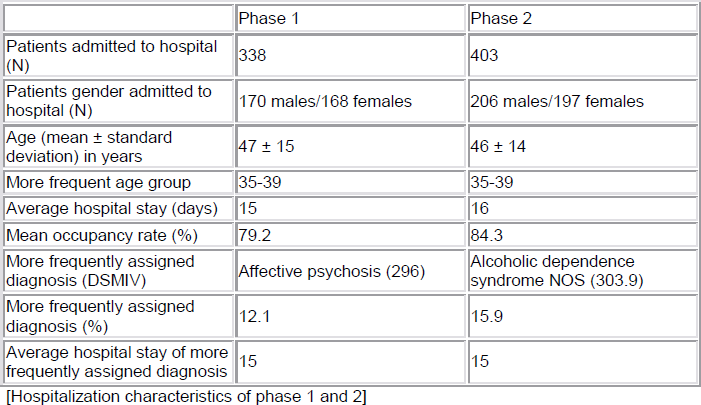Refine listing
Actions for selected content:
Volume 26 - May 2011
Contents
P03-579
Quality of life in the west of iran: a cross-sectional descriptive and analytic study
-
- Published online by Cambridge University Press:
- 16 April 2020, p. 1749
-
- Article
-
- You have access
- Export citation
P03-580
The relationship between 2D:4D ratio and systemizing and empathy quotients in parents of people with autism spectrum disorders
-
- Published online by Cambridge University Press:
- 16 April 2020, p. 1750
-
- Article
-
- You have access
- Export citation
P03-581
Acute and transient psychotic disorder in Latvia: Dynamic changes of diagnosis and clinical features of first-episode
-
- Published online by Cambridge University Press:
- 16 April 2020, p. 1751
-
- Article
-
- You have access
- Export citation
P03-582
Effect of worship level in female student mental health
-
- Published online by Cambridge University Press:
- 16 April 2020, p. 1752
-
- Article
-
- You have access
- Export citation
P03-583
Hypothyroidism and psychosis: a case report
-
- Published online by Cambridge University Press:
- 16 April 2020, p. 1753
-
- Article
-
- You have access
- Export citation
P03-584
A study gauging perceived social support and loneliness with life satisfaction among students of golestan university of medical sciences
-
- Published online by Cambridge University Press:
- 16 April 2020, p. 1754
-
- Article
-
- You have access
- Export citation
P03-585
Patient centred teaching: is it effective in teaching psychiatry to medical students?
-
- Published online by Cambridge University Press:
- 16 April 2020, p. 1755
-
- Article
-
- You have access
- Export citation
P03-586
Audit on the documentation of patients medication in the letters from psychiatrists to the generalpractitioners
-
- Published online by Cambridge University Press:
- 16 April 2020, p. 1756
-
- Article
-
- You have access
- Export citation
P03-587
ADHD and driving
-
- Published online by Cambridge University Press:
- 16 April 2020, p. 1757
-
- Article
-
- You have access
- Export citation
P03-588
A narrative literature review on the applications of medical laboratory tests in the clinical practice of psychiatry: general areas and specific considerations
-
- Published online by Cambridge University Press:
- 16 April 2020, p. 1758
-
- Article
-
- You have access
- Export citation
P03-589
Inclusion of an alcoholic Rehabilitation Unit in a general psychiatric inpatient service
-
- Published online by Cambridge University Press:
- 16 April 2020, p. 1759
-
- Article
-
- You have access
- Export citation
P03-590
Do we care enough about epilepsy in learning disability inpatient population?
-
- Published online by Cambridge University Press:
- 16 April 2020, p. 1760
-
- Article
-
- You have access
- Export citation
P03-591
The examination of the observation forms for the risky patients in the psychiatry clinics comprehensively and quantitatively in terms of nursing problem areas
-
- Published online by Cambridge University Press:
- 16 April 2020, p. 1761
-
- Article
-
- You have access
- Export citation
P03-592
A typology of patients’ relatives with conversive and/or dissociative disorder built from the relationship established with these patients in the southeast Brazil: A clinical-qualitative study
-
- Published online by Cambridge University Press:
- 16 April 2020, p. 1762
-
- Article
-
- You have access
- Export citation
P03-593
The viennese psychiatric intensive care unit - diagnostic distribution
-
- Published online by Cambridge University Press:
- 16 April 2020, p. 1763
-
- Article
-
- You have access
- Export citation
P03-594
The viennese psychiatric intensive care unit - therapeutic modalities
-
- Published online by Cambridge University Press:
- 16 April 2020, p. 1764
-
- Article
-
- You have access
- Export citation
P03-595
Crisis treatments: improvements in symptomatic, defense mechanisms, recovery style and social functioning
-
- Published online by Cambridge University Press:
- 16 April 2020, p. 1765
-
- Article
-
- You have access
- Export citation
P03-596
SWN (subjective well-being under neuroleptics) in clinical practice
-
- Published online by Cambridge University Press:
- 16 April 2020, p. 1766
-
- Article
-
- You have access
- Export citation
Research Article
CS01-01 - Pathological gambling: impulse controle disorder or addiction?
-
- Published online by Cambridge University Press:
- 16 April 2020, p. 1767
-
- Article
-
- You have access
- Export citation
CS01-02 - Alcohol and nicotine
-
- Published online by Cambridge University Press:
- 16 April 2020, p. 1768
-
- Article
-
- You have access
- Export citation
